Are you struggling to learn German? Finding it hard to find the time between work and a little free time for yourself? I may have a solution for you. Watching films in German is a great way of improving your language skills while absorbing a bit of local culture. Even if you already speak good German, movies are an excellent way to engage with social and political themes being discussed in Germany today.
When I was first in Germany, I improved my German no end by watching subtitled films. It’s best to start with English subtitles so that you don’t get completely lost. When your German is a little better, watching German subtitles helps you understand how the sounds you hear match the words you see in the subtitles.
The question remains, what to watch? When I was compiling my list of the best films of 2021, I noticed that a lot of good German films have been released recently. Using this as a basis, here’s a summary of some of the best German-language films released in the 2020s. Covid has affected release dates a little, but there are all sorts of other ways to find them online.
1. Ein Bißchen bleiben wir noch
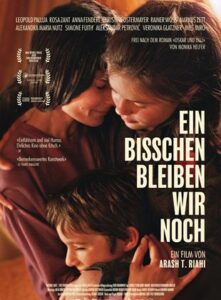 2020, Director: Arash T. Riahi
2020, Director: Arash T. Riahi
A remarkable Austrian film about the everyday life of a pair of Chechen refugees. After their mother is taken into a psychiatric hospital, Oskar and Lilli go on the run, but are eventually caught and fostered out (separately of course) to well-meaning liberal carers. Their new guardians have good intentions, even if they are insufferably smug, and the film treats them with critical understanding. But it never loses sight of the poor kids who are the real victims of the piece. A bleak film of misplaced hope which still has space to appreciate its few moments of joy.
2. Contra
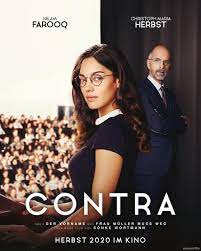 2020, Director Sönke Wortmann
2020, Director Sönke Wortmann
A film I put off going to see for a long time, because most German films about race end up being horribly patronising, and often quite Islamophobic. Be pleasantly surprised at this story of how a working class female Muslim law student deals with institutional sexism and racism. This is much more than just a “worthy” film though – it is intelligently written and shows a nuanced understanding of character and class. And it’s funny. The plot seems a little obvious at first, but then it takes the stereotypes you’d expect from this sort of film and turns them upside down.
3. Je suis Karl
 2021, Director: Christian Schwochow
2021, Director: Christian Schwochow
Another German film about race, and again one which subverts accepted wisdom. What happens when the victim of an apparent racist bomb attack enters the company of Neo-Nazi Identitarians? This is a film that treats the enemy seriously, and shows how they have moved on from just trying to recruit Sieg Heiling skinheads. Instead, they talk about saving the planet and women’s rights. They also profit from the Left’s inability to see any problems in the EU. Some people didn’t like it, as they felt that it helped legitimize the Nazis. I think that these critics are missing the point.
4. Kokon
 2020, Director: Leonie Krippendorff
2020, Director: Leonie Krippendorff
A touching tale of first love, where Nora’s “normal” teenage problems are intensified because the love of her life is (a) unpredictable and (b) a girl. There is a metaphor going on about Nora’s pet caterpillars emerging from their cocoon but the story of working-class multi-cultural life transcends the usual clichés. It’s a life-affirming film, but not short of deep heartache. In other words, it treats a gay romance exactly the same way good film treats heterosexual young love. Maybe it’s a shame that this is exceptional, but this is a rare gem.
5. Who’s Afraid of Alice Miller?
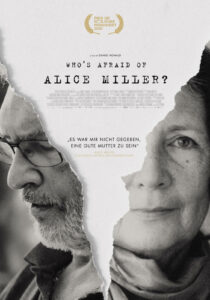 2020, Director: Daniel Howald
2020, Director: Daniel Howald
I had never heard of Alice Miller before I saw this film, but in her native Switzerland she was a famous psychologist and media personality. This is the pained story of her life, told by her son Martin, who had, let’s say, a difficult relationship with his mother. It’s a story which takes in the Holocaust, the Polish resistance, and Alice’s later public campaign against child abuse. We learn a lot about the often strained relationship between parents and their children, but we are left to make up our own minds about the individual cases that we view.
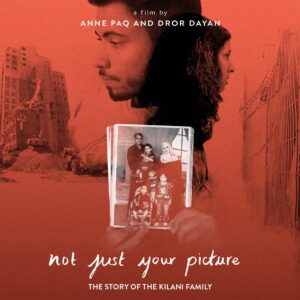 2021, Directors: Anne Paq and Dror Dayan
2021, Directors: Anne Paq and Dror Dayan
Ramsis and Layla Kilani are the children of a Palestinian man who was killed during the bombing of Gaza in 2014. The film shows their attempt to gain justice for their father Ibrahim. They demand that the German government at the very least acknowledges that a German citizen was brutally killed by the Israeli army. The film shows the personal development of the two siblings from tongue-tied kids to seasoned activists. This is, sadly, not an untypical story, but it is one which represents the experience of many German Palestinians.
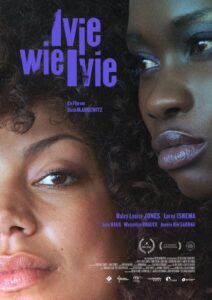 2021, Director: Sarah Blaßkiewitz
2021, Director: Sarah Blaßkiewitz
Another German film dealing with race, and again one which gets the balance right. This one is essentially about the different experiences of two Black women in cosmopolitan Berlin and Leipzig in the East. Although this sounds like the film could be worthy but dull, there is enough character development to avoid being too preachy. There are no spectacular events, no car chases, just people trying to get on with their lives, despite the pervasive institutional racism that they experience. On another level, it’s just another family drama, and none the worse for that.
8. Regeln am Band bei hoher Geschwindigkeit
 2020, Director: Yulia Lokshina
2020, Director: Yulia Lokshina
When Yulia Lokshina started secretly filming workers in German slaughterhouses she could hardly anticipate that they would become the centre of a scandal about insanitary working conditions which helped cause the quick spread of the Covid virus. Tales of unsafe workplaces play alongside a school group rehearsing Brecht’s St Joan of the Stockyards. Meanwhile, Eastern European workers are played off against each other to the detriment of everyone’s health. The documentary has no obvious solution, but shows us a desperate situation which must be changed.
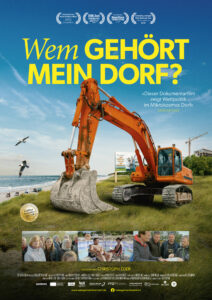 2021, Director: Christoph Eder
2021, Director: Christoph Eder
Gentrification was the big political question in Berlin in 2021, but this film shows the same subject in a quite different context. Göhren auf Rügen is an old tourist village on the banks of the Baltic in East Germany. After the wall came down, a generation left town. The people who stayed are now fighting rapacious property developers. For years, the parish council has consisted of the same old men who have nodded through the building of holiday homes, despite the threat to the environment. But one woman has had enough and is leading a fight to resist them.
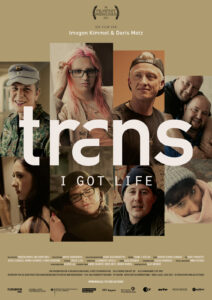 2021, Directors: Imogen Kimmel and Doris Metz
2021, Directors: Imogen Kimmel and Doris Metz
A simple documentary about seven Trans men and women and their lives as bus and lorry drivers, social media junky and army colonel. Although the film does not hide from the difficulties of living in a transphobic society, it is generally upbeat and shows people to a greater or lesser extent coping with the problems that are flung at them. In a sense it is saying that Trans people can be normal too – some are fun, others can be irritating, you know, just like “real” people. It is a shame that films still need to make this point, but if one has to, it’s great that it’s done as elegantly as this.
11. Klassenkampf
 2021, Director: Sobo Swobodnik
2021, Director: Sobo Swobodnik
On one level, a discussion of Didier Eribon’s book, ‘Return to Reims’. This is director Sobo Swobonik coming to terms with his working class upbringing in Swabia. He had since, reluctantly and distrustfully, entered the middle classes, and does not feel quite right either with his own family or with the environment In which he now lives. Klassenkampf tries to understand class today. While I’m not convinced by all the answers that it suggests, it is never less than provocative.
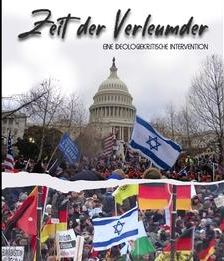 2021, Directors: Dror Dayan and Susanne Witt-Stahl
2021, Directors: Dror Dayan and Susanne Witt-Stahl
In February 2018, there was a historic conference in Berlin to discuss why it is so difficult to talk about Palestine in Germany. This is a documentation of the conference, which took place while Jeremy Corbyn was still Labour leader. Important parallels are drawn with the defamation campaigns in other countries. The film, like the conference, underestimates the potential for solidarity in Germany, but it accurately documents the problems which we have to confront.
 2020, Director: Burhan Qurbani
2020, Director: Burhan Qurbani
A sumptuous film which almost justifies its running time of over 3 hours. Burhan Qurbani reimagines Alfred Döblin’s classic novel in modern Berlin. Hero Franz becomes the refugee Francis (later Frank as he “integrates” into German society). Berlin is shown in all its sordid detail, oozing corruption and racism beneath the glossy surface. It looks like a sleek music video, but a strong plot and a cast of great actors provide the film with some serious and astutely observed content.
 2021, Director: Maria Schrader
2021, Director: Maria Schrader
What if science were able to produce a robot who was indistinguishable from a man, except that he understood what women really want? Ich bin dein Mensch thankfully does not get too drawn into the gimmick. Maren Eggert as Alma is not interested in a relationship, Dan Stephens as the humanoid Tom, is ever so slightly unreal, though you can’t put your finger on exactly why. There’s a little too much sentimentality by the end, but it’s still worth a watch.
15. Oeconomia
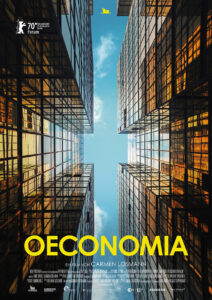 2020, Director: Carmen Losmann
2020, Director: Carmen Losmann
Carmen Losmann organises a series of interviews with financial “experts”, pretends that she’s a thick little woman, then lets them destroy capitalism with their own words. There are a lot of shots of economic bigwigs with dropped jaws realising what they’ve just said. This is not a film that needs to offer any solutions to the devastation and inequality caused by capitalism. It simply shows things as they are. It’s now up to us to do something about it.
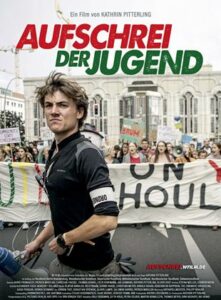 2020, Director: Kathrin Pitterling
2020, Director: Kathrin Pitterling
A brutally honest documentation of Fridays for Future Berlin, who have now been demonstrating every week for well over two years, without creating any obvious response from the German government. We see the righteous anger of the demonstrators and the huge number of people they are able to mobilise. We also share their sense of impotence. Do they need to start burning cars to get a response? Again, the questions are asked but it’s up to us to answer.
17. Wilkommen in Siegheilkirchen
 2022, Director: Marcus H. Rosenmüller and Santiago López
2022, Director: Marcus H. Rosenmüller and Santiago López
A film that’s not even out yet (its release was postponed because of Corona). It’s the story of Rotzbub, a kid in a provincial Austrian village. Rotzbub experiences first love, fights with the local Nazis and getting drunk with the local hippie – all the usual experiences of growing up. It’s a cartoon which lampoons hypocrisy and is most definitely on the side of the good guys. WARNING: the Austrian rural accent can be pretty impenetrable so this is not one for Deutscheinsteiger.
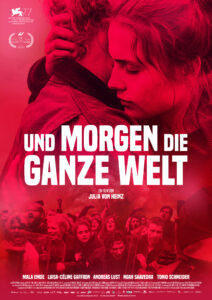 2020, Director Julia von Heinz
2020, Director Julia von Heinz
A film which honestly discusses how we can best fight the rising tide of fascism. Und morgen die ganze Welt locates itself in the autonomous movement, which is not the most politically interesting area for me, but it is definitely attractive for many young people who are shocked by the normalisation of fascism and the AfD. There is a good discussion about whether political violence is necessary, but there’s always a slight feel of middle class kids slumming it.
19. Nebenan
 2021, Director: Daniel Brühl
2021, Director: Daniel Brühl
This is where director/star Daniel Brühl, the Wunderkind of German cinema, gets to poke fun at himself. He plays Daniel, a bigshot German actor who’s currently negotiating a part in a big Marvel-type franchise film. Daniel is a bit of an arsehole and has an embarrassing encounter in a local pub with a neighbour who knows a little too much about his personal life. It doesn’t fully work because it’s hard to envisage the real Daniel Brühl being such a dick. Nonetheless it’s a noble failure.
20. Herr Bachmann und seine Klasse
 2021, Director: Maria Speth
2021, Director: Maria Speth
An empathetic documentary of a school teacher and his multiracial class in Hessen. Herr Bachmann challenges his students, and tries to bring them out of themselves. He feels almost Saint-like, but he is doing what he can with the resources available to him. You leave the film being astounded at the contributions of individual teachers, but also at the inadequacies of the state education system. One warning: at 3½ hours, this is a bit of a bum-number.




